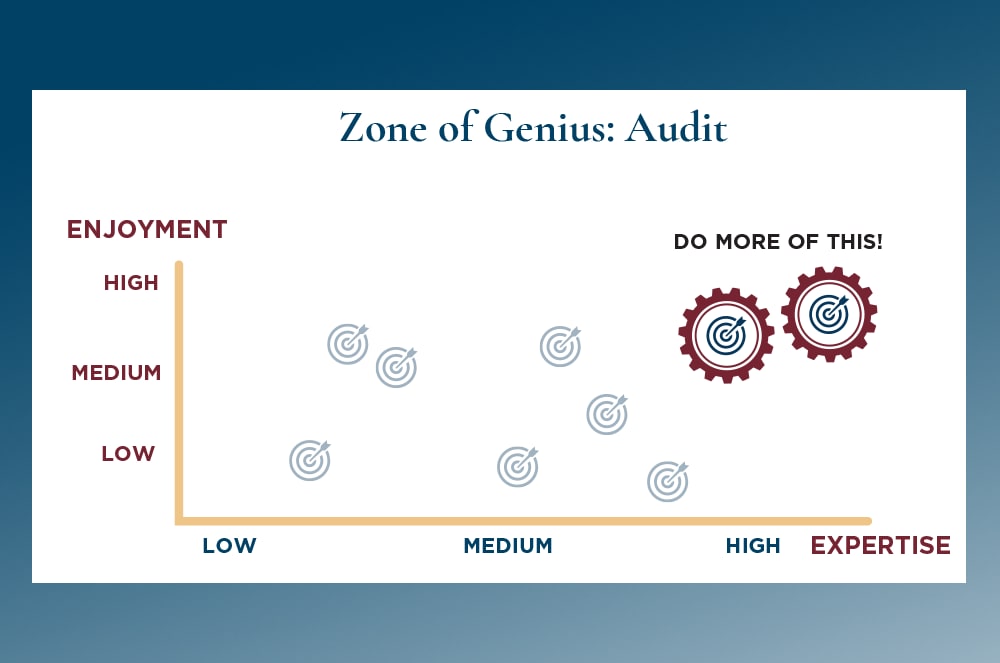
Have you ever wondered why certain activities fill you with joy and make time disappear, while other activities fill you with dread and boredom? How is it that some things come so easily to you, and others feel like a drag?
It’s surprising how different this is for everybody. What’s a piece of cake for you is somebody else’s nightmare, and vice versa.
The activities that come naturally to you are in your “Zone of Genius.” This term, coined by Gay Hendricks in his book The Big Leap, describes the sweet spot where your talent and your joy meet: the activities that you love and are very good at.
As a high-performance coach and trainer, I have found this concept to be a twofold magic tool: It has helped me to discover my own Zone of Genius (in-depth teaching, speaking, and coaching) and given me a framework I can use to support my clients to find their Zone of Genius so they can thrive in their careers and businesses.
In addition to exploring the four zones—Incompetence, Competence, Excellence, and Genius—let’s examine the pitfalls of the Zone of Excellence, discover how you can find your Zone of Genius, learn how to support your team to work from their Genius, and figure out what you can do when something falls in your, or a team member’s, Zone of Incompetence.
The Four Work Zones
If you look through the tasks you do every day in your work, you will notice that they fall into four distinct categories. Hendricks named these categories based on expertise versus enjoyment.
- Zone of Incompetence: You have no knowledge (and often therefore, no enjoyment) in a particular area or activity. Enjoyment is low and you struggle to get into a flow, as the challenge is too high, and skills are unfamiliar.
- Zone of Competence: You have some knowledge and experience in an area. You are a step above your Zone of Incompetence, yet the output of your work is still average as you have not yet developed expertise.
- Zone of Excellence: You are highly skilled in and greatly enjoy an activity. You can easily get stuck in this Zone, as you are rewarded for the work you do, and yet, it’s not what you love doing the most.
- Zone of Genius: You hit that sweet spot where you are highly skilled and love what you’re doing. This feels easy and natural, and you believe you could spend all day immersed in the activity.

The Danger Zone
The biggest obstacle to working in your Zone of Genius is getting stuck in your Zone of Excellence, also known as the Danger Zone.
In your Zone of Excellence, you deliver high-quality work, you are praised for what you do, and you find some satisfaction in it. Yet, over time, it gradually feels like a burden, and eventually you realize you would rather do something else entirely.
One way to identify if you are primarily in your Zone of Excellence is to ask yourself: If I had all the time and money in the world, would I still want to be doing this activity?
If the answer is no, then you are probably doing it because you are getting paid for it, you have experience in it, and you’re good at it.
Often, the Zone of Excellence corresponds to activities you didn’t naturally like at first, but came easily to you. You continued to train and became very skilled (going from Competence to Excellence), yet, it’s not what you want to be doing.
This was exactly how I felt when I started my career. I had learned math and physics, trained, and began working as an engineer. At first, I quite enjoyed it, and did well. With time, though, it became obvious this wasn’t something I truly cherished, and I was only doing that job because it was what I had studied and learned.
After realizing my interests were related to psychology and self-improvement, and my Zone of Genius was around coaching and training, I pivoted my entire career and launched my business as a coach.

Listen to The Toastmasters Podcast to hear more from Katie Stoddart.
Your Zone of Genius
If you feel stuck in your Zone of Excellence, and want to uncover your Zone of Genius, you can make note of which activities you enjoy most, what you loved doing when you were younger, and what comes easily to you.
Often, you don’t need to change your whole career as I did but rather implement small changes that will help you discover where you truly thrive.
As you reflect on how to spend more time and energy doing the work or activities you truly enjoy and excel in, you might wonder if it is sustainable, or even realistic, for you to spend most of your time in this Zone.
This question often comes from the belief that work should be hard, and it can be challenging to let go of that belief and allow yourself to enjoy your work more. Realigning your work with your interests and skills, and outsourcing (or eliminating) the tasks that you don’t enjoy, will make you 10 times more productive. When you love what you are doing, the quality of your output is significantly better and you are more motivated to work longer hours if need be.
You will have greater success hiring someone who is naturally passionate about their field than someone who just has experience in it.
The aim is to gradually increase the time you spend in doing work that you truly enjoy and excel at. You can do this by:
- Discovering your Zone of Genius
- Making a list of activities you want to reduce or stop
- Gradually eliminating or outsourcing some of these tasks
- Reviewing the impact this shift has in your career or business
Note that this is a gradual and iterative process. If you have your own business, it’s about building the capacity to outsource. If you are an employee, it comes down to having honest conversations with your manager and team, or changing your job or position.

Ideally, you want to aim to spend at least 50% of your working time in your Zone of Genius. Remember it’s not just about having more fun in your work (though that will be the case too!), it’s about delivering high-quality outputs. Your performance will skyrocket when you are working in this Zone.
Leading Your Team Toward Genius
As a leader, how can you support your team to discover their Zone of Genius, and help them prioritize it?
A great place to begin is by assessing the strengths of a person and noticing where they truly thrive. Do their eyes shine when they are giving a presentation, brainstorming ideas, or putting together a plan of action? What do they seem to love doing most, and when do you feel that their output is truly outstanding?
As a leader, you have two great ways to go about discovering someone’s areas of strength:
- Take note of what you have noticed about them and make your own evaluations.
- Ask them to go through a strength test and have a direct conversation about what they feel they are best at and what they love most in their work.
Once each team member is aware, you can support them in thriving. This is when the strategic element comes in: rearranging people’s work so that they spend more time in their Genius.
This works for future team members as well. You will have greater success hiring someone who is naturally passionate about their field than someone who just has experience in it.
When you love what you are doing, the quality of your output is significantly better.
Making this perspective shift creates a higher-performing team and allows them to thrive in their work. It also makes it easier for you as a leader; you won’t need to “push” so much for results because your team will be naturally motivated by their own interests.
If you want to take it a step further, you can analyze the over-arching strengths of the team. What makes your team thrive? What do they excel at doing together? What activities bring the most synergy to your team?
By understanding and working with everyone’s Zone of Genius—from the leader to each team member to the entire team—you are truly setting yourself up for success!
When you love what you are doing, the quality of your output is significantly better.
It’s easy to believe that work only counts as work if it is painful. It isn’t natural to love Monday mornings, or to thrive in our work. Yet, the most successful business owners in the world share this one belief: “If you love what you do, you’ll never have to work a day in your life.”
What would happen to you, your team, your career, and your business, if you started to embrace this motto, and worked from your Zone of Genius?
I invite you on this journey.
Katie Stoddart is founder and CEO of The Focus Bee, a transformative leadership platform. She is an award-winning transformative coach and leadership facilitator; the host of the weekly podcast The Focus Bee Show; and the author of The Magic of Focus. She lives in Stockholm, Sweden. Learn more at linkedin.com/in/katiestoddart and katiestoddart.com.
Related Articles

Communication
What's Your Communication Style?

Communication
Can a Personality Test Make You a Better Communicator?

Leadership



 Previous
Previous

 Outside the Zone of Genius
Outside the Zone of Genius
 Previous Article
Previous Article
